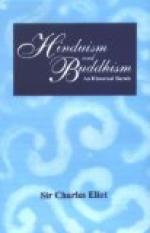The two Shan states which arose from the ruin of Pagan, namely Panya (Vijayapura) and Sagaing (Jeyyapura), encouraged religion and learning. Their existence probably explains the claim made in Siamese inscriptions of about 1300 that the territory of Siam extended to Hamsavati or Pegu and this contact of Burma and Siam was of great importance for it must be the origin of Pali Buddhism in Siam which otherwise remains unexplained.
After the fall of the two Shan states in 1364, Ava (or Ratnapura) which was founded in the same year gradually became the religious centre of Upper Burma and remained so during several centuries. But it did not at first supersede older towns inasmuch as the loss of political independence did not always involve the destruction of monasteries. Buddhism also flourished in Pegu and the Talaing country where the vicissitudes of the northern kingdoms did not affect its fortunes.
Anawrata had transported the most eminent Theras of Thaton to Pagan and the old Talaing school probably suffered temporarily. Somewhat later we hear that the Sinhalese school was introduced into these regions by Sariputta,[155] who had been ordained at Pagan. About the same time two Theras of Martaban, preceptors of the Queen, visited Ceylon and on returning to their own land after being ordained at the Mahavihara considered themselves superior to other monks. But the old Burmese school continued to exist. Not much literature was produced in the south. Sariputta was the author of a Dhammathat or code, the first of a long series of law books based upon Manu. Somewhat later Mahayasa of Thaton (c. 1370) wrote several grammatical works.
The most prosperous period for Buddhism in Pegu was the reign of Dhammaceti, also called Ramadhipati (1460-1491). He was not of the royal family, but a simple monk who helped a princess of Pegu to escape from the Burmese court where she was detained. In 1453 this princess became Queen of Pegu and Dhammaceti left his monastery to become her prime minister, son-in-law and ultimately her successor. But though he had returned to




